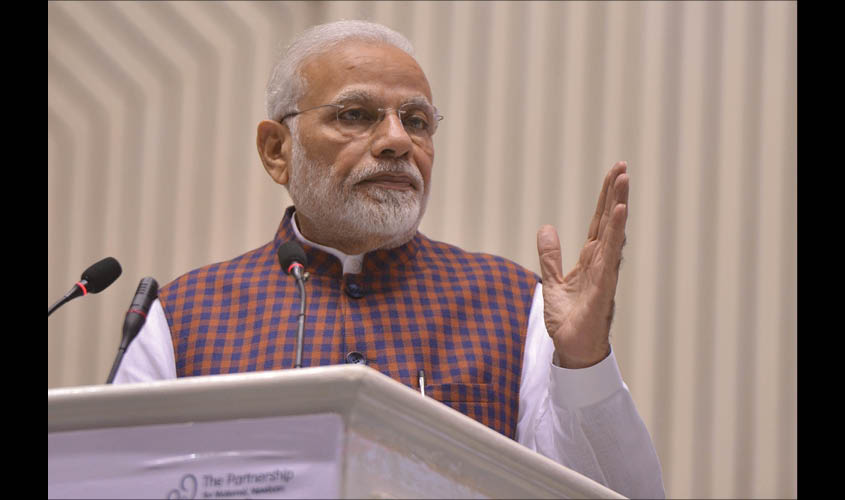Principal Secretary to the Prime Minister, Nripendra Mishra has convened several meetings to work out details of the scheme in such a manner that the benefits go to the deserving.
New Delhi: The Narendra Modi government is working on rolling out a Universal Basic Income (UBI) scheme to alleviate poverty in the country. The scheme will guarantee a fixed income to financially weaker sections of society. Prime Minister Narendra Modi is personally monitoring the preparations for UBI, with the government think-tank, Niti Aayog and the Ministries of Finance and Agriculture working out modalities for the same. The government’s eagerness to launch the scheme can be gauged from the fact that more than 20 meetings have already taken place at the level of the Prime Minister’s Office (PMO), to assess the feasibility ever since it was suggested in the Economic Survey of 2016-17. The low profile Principal Secretary to the Prime Minister, Nripendra Mishra is known to have convened several meetings to work out details of the scheme in such a manner that the benefits go to the deserving.
The scheme is likely to prove to be a game changer for the Narendra Modi government, in a build-up to the 2019 Lok aSabha elections that will be held in a few months’ time.
Government sources said that the scheme could be announced partially and later the benefits would be extended to a larger swathe of the population. To begin with, sources said, the government may announce a basic income of Rs 2,000 to Rs 3,000 a month for farmers, unemployed youths, women and elderly people. Gradually, more beneficiaries are likely to be added, including from the tribal population, those from Other Backward Classes and those belonging to weaker social strata.
Official sources said that a budget that appeals to the rural poor and deals with the agrarian crisis is also likely. “Universal Basic Income is a major step to bring people out of poverty as well as address the agrarian crisis. Government is seriously considering the announcement of UBI to help pull people out of poverty,” said an official.
On the political front, BJP is looking at UBI as a weapon against the Opposition, which has been using farm loan waiver to lure farmers. In Rajasthan, Madhya Pradesh and Chhattisgarh, where the Congress came to power recently, the new governments have announced conditional farm loan waivers. However, PM Modi and the top leadership of the BJP are averse to a farm loan waiver as this would benefit just one section while leaving many others disgruntled.
“The government is serious about the agrarian crisis, but at the same time it is also committed to bring the underprivileged out of poverty. Farm loan waiver may benefit a particular section, but a Universal Basic Income will cover a larger population, which is unable to meet its ends,” said a senior BJP leader.
While a pilot project of UBI was rolled out in 20 villages of Madhya Pradesh in 2013, the BJP recently promised UBI in its manifesto in Rajasthan Assembly elections. The BJP promised a fixed income of Rs 5,000 per month to the unemployed youths of Rajasthan.
Government sources said that in UBI, the Centre can give the states the freedom to identify the beneficiaries and hence this may encourage the states to partner with the Central government in launching the scheme. States like Bihar and Uttar Pradesh, with a large number of unemployed youths and urban and rural poor have already expressed their willingness to launch the scheme.
A government official explained that UBI would mean a massive shift in the way revenue received through taxation is spent. Currently, the money earned through taxation is used to fund various services that the government provides, as well as the welfare subsidies it pays for. But with UBI, the government will pay the money directly to beneficiaries who will have the freedom to spend the money according to their needs.
In Madhya Pradesh, the pilot project for UBI in collaboration with UNICEF yielded positive results. In 20 villages, fixed sums of Rs 300 per adult and Rs 150 to minors were given. While it was found that the villages spent more on food and healthcare, the children’s school performance improved in 68% of the families. The time spent in school, personal savings etc., also increased. The study also found an increase in economic activity as well as an increase in savings, an improvement in housing and sanitation, improved nutrition, less food poverty, improved health and schooling, greater inclusion of the disabled in society and a lack of frivolous spending.
The Economic Survey of 2016-17 had favoured unconditional cash transfers to the poor, given the inefficiencies in the plethora of welfare schemes of the Union and state

